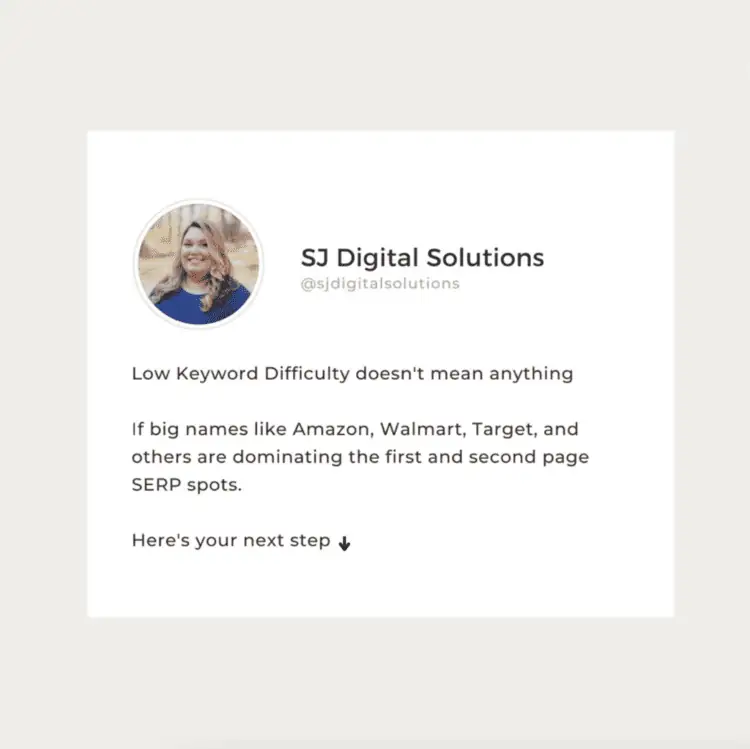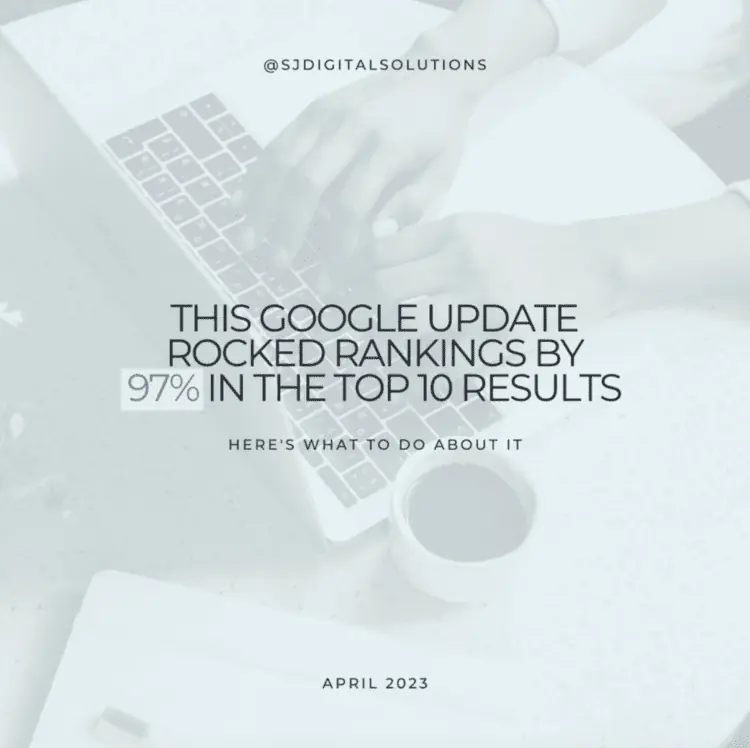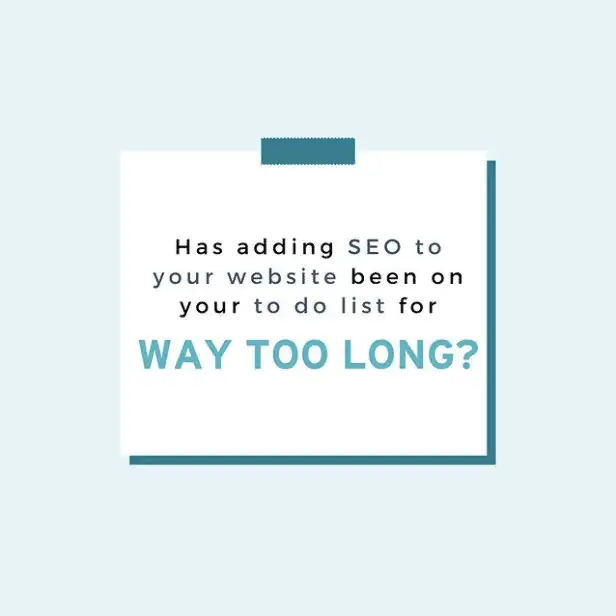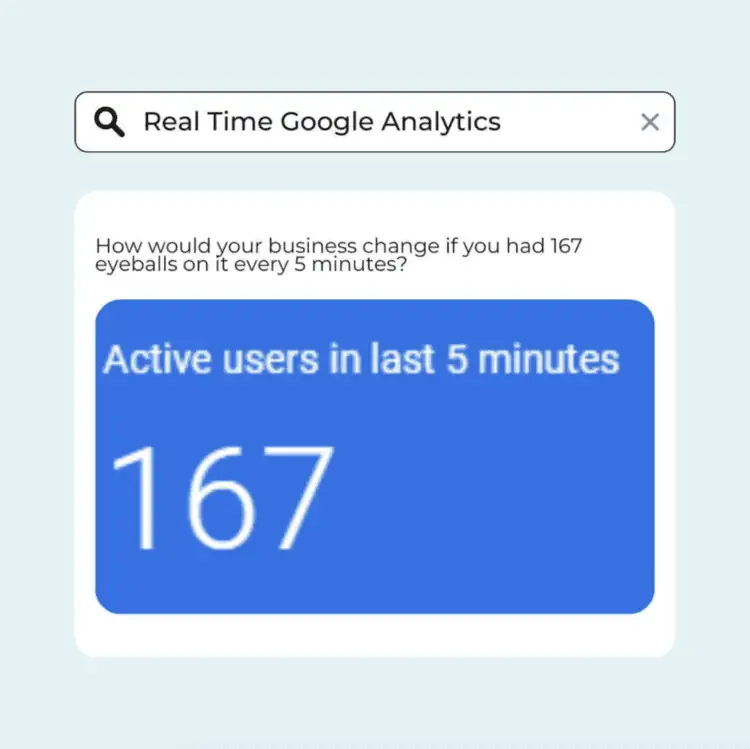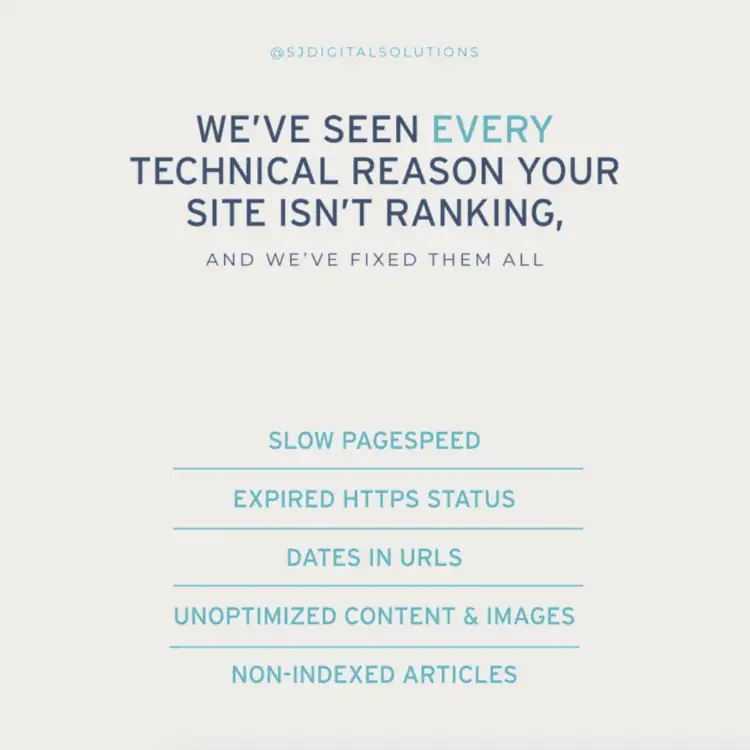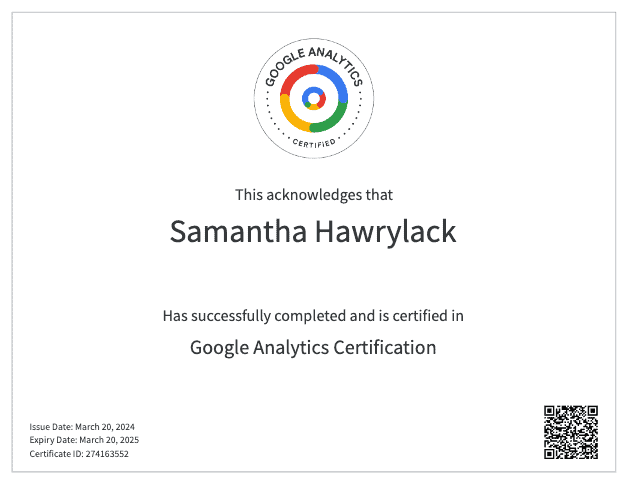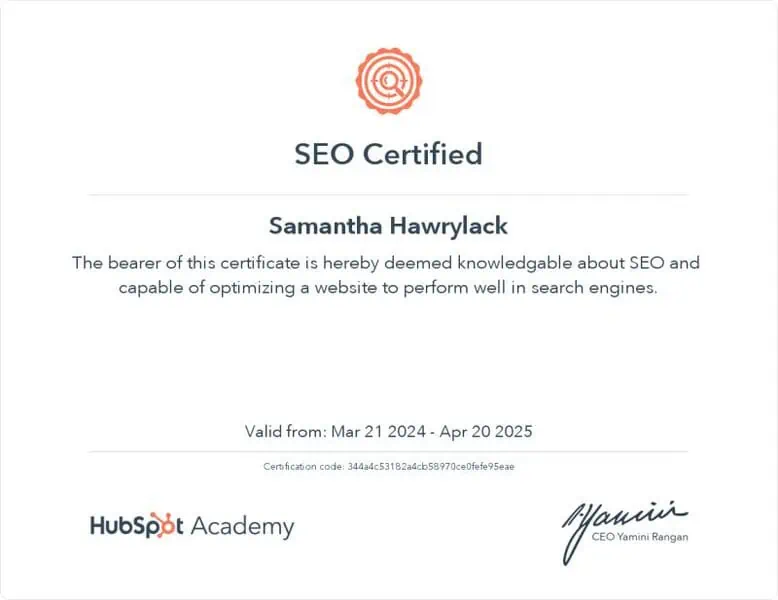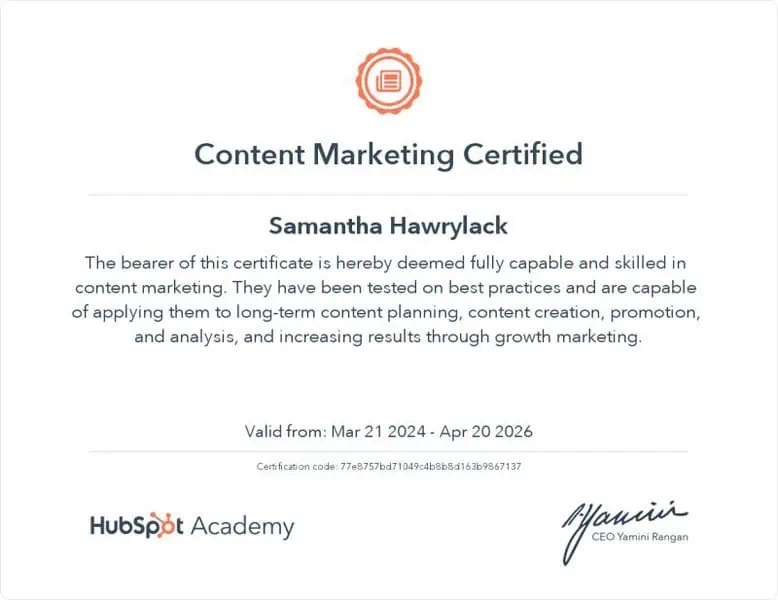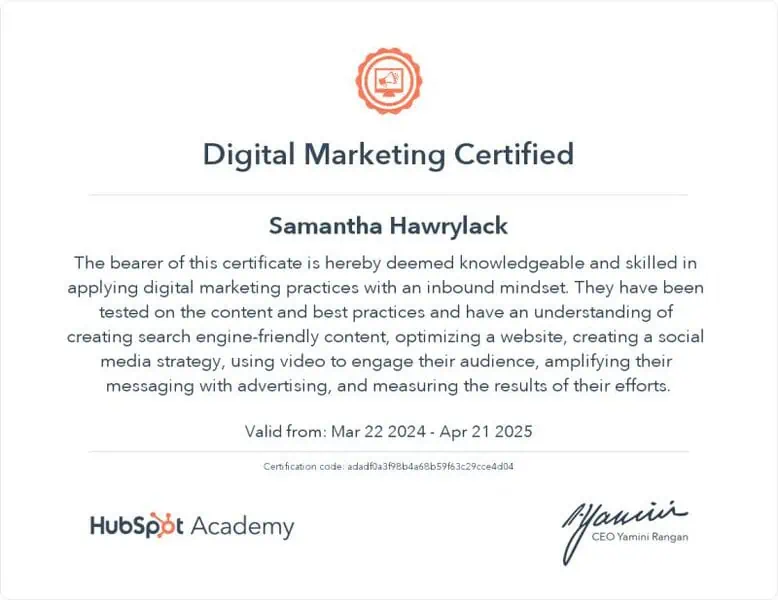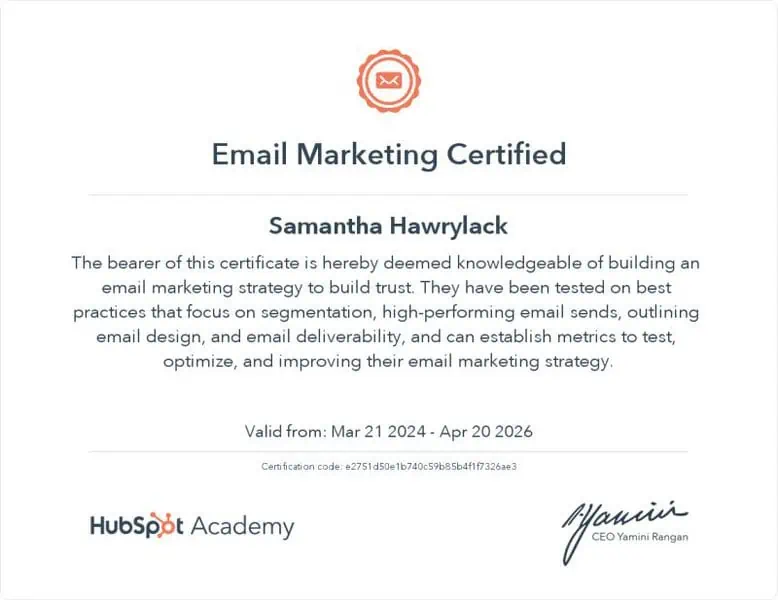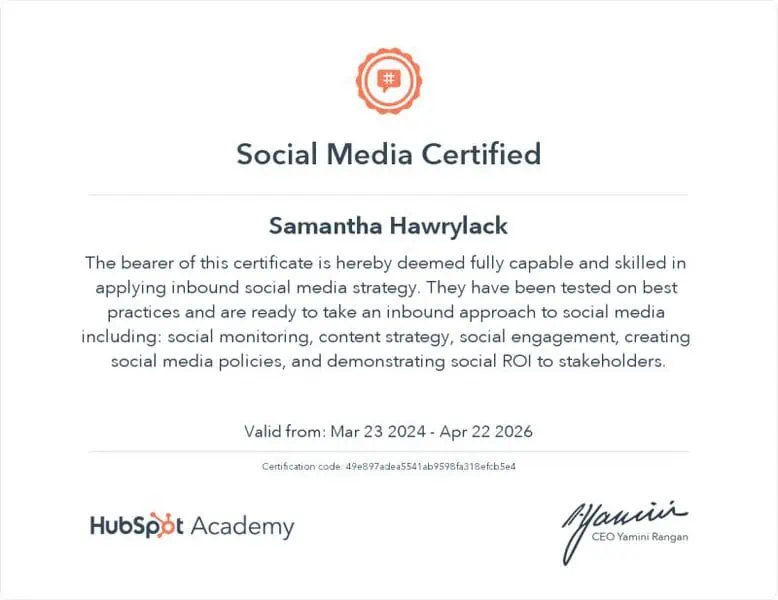Let’s explore how search engines work and uncover the actual value of SEO, including why simply owning a website isn’t enough to ensure it’s optimized for search engine results.
The ROI of investing in an SEO strategy is incredible for your business. Think of it this way: When was the last time you went to page 30 on Google to get the answer you were looking for? Probably never. By showing up first in Google search results, you are building your brand’s visibility and credibility.
Tune in as we unravel the benefits and fundamentals of a great SEO marketing plan and empower you to navigate the SEO world with confidence!
What You Can Expect
- What is SEO?
- Recent Google updates and how it is impacting your website.
- Learn how SEO cost-effectively drives visibility, credibility, and drives organic traffic from the right eyeballs
- Reveals why simply having a website isn’t enough for SEO and discusses the necessity of SEO strategy to stand out in a saturated online space
- How to implement fundamental strategies and techniques to improve your website’s search engine rankings
- Explores practical strategies to dispel SEO challenges and offers insights on how to effectively address them
“SEO is one of the most powerful tools you can have in your arsenal, especially as an entrepreneur.“
~ Samantha Hawrylack
LISTEN TO THIS EPISODE OF BEHIND THE CLICKS ON YOUR FAVORITE PODCAST PLAYER AND FOLLOW ALONG SO YOU DON’T MISS THE NEXT EPISODE: APPLE – SPOTIFY – GOOGLE
Click here for the transcript
Let’s kick things off by defining what search engine optimization, abbreviated as SEO, really is and why it matters. At its core SEO is a pillar of digital marketing that involves optimizing your website and everything on it. By that, I mean, your content, your images, your backend, et cetera. The purpose is for your company to rank higher in search engines like Bing or Google.
But it’s not just about ranking or saying that you’re ranking for a particular keyword. It’s about the visibility, credibility, and ultimately, The driving of the right eyeballs to your website. And by eyeballs, I mean organic traffic. SEO involves so many different techniques and strategies that are all aimed at improving your website’s visibility on search engine results pages or the SERPs.
By appearing higher in search results, your business can attract more organic traffic, which leads to increased opportunities for engagement and engagement. and conversions or sales. Over the last several years, Google has pushed out so many updates to their algorithm that make it really, really difficult for people who have an SEO strategy to keep up.
And it causes a lot of frustration because it involves a lot of changes and different things that you have to incorporate into your everyday strategy. But at the end of the day, as frustrated as people who follow, you know, the SEO world and have that as a strategy are with these updates. Google is just trying to provide the most relevant and useful results for users.
So understanding these algorithm changes and adapting your SEO strategies accordingly is crucial for maintaining and improving your search rankings over time. That way it’s not such a swing from being a highly ranked for a search term. to kind of swinging to maybe you’re on page like 30 for a search term.
I always like to tell people that SEO is so much better than social media and any paid ads you could ever do. Paid ads, they provide immediate visibility, which is great in some circumstances, but organic traffic generated through SEO offers long term, sustainable traffic, and it’s more cost effective.
Paid ads are very pay to play. You need to keep paying for those clicks every single time that your ads are live and active, and you need to constantly be tweaking them, you know, every couple days until you really find a strategy that works. Whereas if you have an SEO strategy that is proven, You can invest in getting one article published and that article performed for you for years down the road.
It can provide results forever. Additionally, it’s a known statistic that users tend to trust organic search results more than if they see that something is ranking at the top of a page because it’s a paid advertisement. And having these organic search rankings can lead to higher click through rates and conversions.
There’s one misconception that I want to clear up real quick. SEO is one of the most powerful tools you can have in your arsenal, especially as an entrepreneur. But you don’t have optimized SEO just because you have a website, just because you’ve invested in a copywriter. Not all copywriters are SEO experts.
What do I mean? Having a website doesn’t guarantee you’re going to automatically rank high in search results or that anyone will be able to see you. There’s a lot more to it than just building a website, having great web design, and hoping for the best.
And there are a few reasons for that that I want to touch on one of them is the saturation of the online space and simply having a website isn’t enough to stand out with the saturation.
When you don’t have a realistic SEO strategy for your authority, your website is definitely going to get lost in the sea of content, and it’s going to make it really difficult for potential customers to find you. And when I say your website authority, I actually am referring to a metric known as DA or domain authority and DR or domain rating.
These two metrics represent how reliable and aged your domain is in the eyes of Google, as well as how many other websites link out to you as a reputable source. The higher your DA or DAR is, the easier it is to rank. your website for different terms that may be more difficult to rank for.
And when I say this, I mean let’s say that you’re trying to go after a keyword that Walmart, Target, some of these big dogs are going after, and you are a new business owner within your first couple of years, chances are that it’s very unlikely for you to rank on page one for those terms.
So when you’re considering your SEO strategy, You need to be doing proper keyword research and not just picking things because other websites are going after those terms. We need to find a similar term that you can target but that is more realistic and easier for your domain to rank for. And to go along with all of that, you need to take your website content and take a step above the competition.
Your goal should always be for everything on your website to be better than anyone else’s more helpful more data driven and Answer every question that a user could have that’s one way to rise above the competition But you also need to think about your SEO strategy in terms of what are your business goals?
And who is your target audience? You need to be considering what the purpose of your website is. Are you trying to sell services? products? Are you trying to get consultation calls right away? Are you trying to build your email list? And then how should you talk to the people who are finding your website?
Those two things are so important because they are the whole reason for even having an SEO strategy in the first place. And these things can be anything from how to create really great content for your website, or it can be something technical like your site’s It’s structure and the performance metrics and the user intent.
So by this point, you’re probably wondering what it takes to truly take advantage of the power of SEO. And I will tell you, it’s not as daunting as it seems and not as technical. Once you get the hang of it, there’s just some fun fundamental principles and strategies that can significantly improve your success and search engine rankings.
And the first one is keyword research and targeting. Like I said before, conducting thorough and realistic keyword research allows you to identify relevant search terms and phrases that your target audience is using. And the key here again is realistic because we want everything that you’re doing to be a good ROI and actually worth the time and money.
money and energy. So by strategically incorporating these keywords into your website’s content and metadata, you can improve your chances of ranking for the search terms that your ideal client is searching for. And the second one is on page optimization. And this sounds really fancy, but at the core, it just means that you’re optimizing each blog post or webpage that you’re doing.
to improve the chances of it be becoming visible. And this could be anything from optimizing your meta titles and meta descriptions, your headers, your URL structures, internal linking. And the goal is to do all of this to enhance the crawlability and relevance for google. Another one is to realize the importance of quality content marketing.
I know there’s a lot of people out there who say just pump out more and more and more content. I go with the stance of there’s no point in pumping out a lot of content unless it’s quality. So you’re better off pushing out once a week, every other week. if the content is going to be higher quality because that’s going to get more of an ROI for you.
And it’s actually a really key ranking factor that Google has pushed out with a lot of their updates in the past couple of years, that they are really looking for things that are very valuable for the reader. It’s informative, it covers every topic, and it adds that personal experience layer. And that’s one of the most important things.
And when you put out quality content marketing. it’s going to attract more organic traffic for you. It’s going to earn you backlinks and establish your brand as an authority in your industry. Another strategy is using off page SEO factors like backlinking and social media. By off page, I mean things like building backlinks from authoritative websites and social media mentions.
These all play a crucial role in determining your website’s credibility and authority in the eyes of search engines. I’m going to talk about this in another episode, so don’t worry if you don’t know what a backlink profile is right now, but building a strong one and fostering a positive online reputation, even not on your own website, out in the online space, all of that can significantly impact your search rankings.
as well as what’s on the actual page itself. And another strategy that many people forget that I like to highlight is you need to start tracking the right metrics. Many people will log into their Google Analytics and Google Search Console and not understand what they’re looking at and I will admit as someone who is in there daily, there’s a lot of stuff that you probably don’t need to be worried about.
So I like to pick out the main details of the most important things to track. like your impressions and what pages are bringing you the most traffic and also your clicks. Another one that I like is what device your readers are coming from and where your website traffic is coming from as well. Whether there’s a percentage of organic traffic versus direct traffic versus social media traffic.
So those are all important things I recommend doing on a monthly basis. I’m going to put out another podcast episode all about what the right metrics to track are. But regardless, you need to be doing all of these different strategies consistently, and also keeping in mind that you need to adapt over time.
These Google updates and new findings that are coming out in the industry are really requiring business owners to be very adaptable and be committed to updating their content over time. Now that’s not to say you should be updating your content weekly, daily, even monthly.
I recommend doing so quarterly if you can and then setting it up in your project management tool as a recurring thing that you and your team make sure that each page is up to date with the latest SEO practices and content.
standards. Of course, that in of itself is a ton to manage as a business owner, not to mention all the other pillars of your business that you have to manage as well.
So along with all of the algorithm updates, I also see business owners struggle with the idea that they need to be seeing traction and they’re willing to put in the work, but it may not necessarily be the right way.
So it’s really important. to balance your short term expectations with the idea that SEO is a long term strategy.
There’s this terminology in the SEO space called white hat and black hat techniques. White hat refers to ways to improve your SEO that are seen as good in the eyes of Google and black hat techniques are seen as not good in the eyes of Google and can result in penalties on your website domain and damage to your website’s reputation and cause Google to basically never want to rank your site.
It’s really important that you do all of these things the right way and not just the things that are going to get you the quickest website traffic because at the end of the day it’s probably not going to be long term because Google is smart and it’s getting smarter every day and they will catch you.
Some of these black hat techniques can include things like doing a guest post on websites that are essentially link farms to build your backlink profile. Those websites are so spammy that you may initially get a little bump in traffic, but it’s not going to last long. Basically, the moral of that story is you want to have a white hat SEO strategy that’s going to get you results over the long term and prioritize being patient with those strategies.
Another thing that I see is that business owners kind of freeze up when technical issues happen on the back end of their website.
They get an email from Google search console that there was something detected and instead of going in to fix it because they don’t know how, they kind of just archive the email, wipe their hands of it, and forget about it because the idea of going into the back end of their website is way too scary.
And I’ve been there. I’m fortunate because John is a software engineer by trade, so that’s just me having luck, but he’s so busy with his day job that I’ve needed to dive into these technical issues myself, so I understand that they can be very overwhelming and scary, but they are so important to, if you don’t feel comfortable addressing them or don’t have time to learn about them yourself, to hire somebody who can, because things like slow page load times, broken links, not having a website’s search rankings.
So we like to recommend that our clients conduct regular site audits. To address all of these technical issues and to do so promptly on the regular schedule so you can help Improve the overall health of your site. So to recap just because you have a website doesn’t mean that you have SEO And unless you have invested time or resources into developing an SEO strategy on your main website pages or on your blog or podcast show notes, then chances are it isn’t optimized to its fullest potential.
However, the investment a hundred percent worth it because the ROI can be truly transformative for your business. The benefits are just incredible and I’ve seen them every day in my own business in terms of leads and visibility for my agency. So you want to really keep in mind the increased organic traffic and visibility that it can drive for you.
And the more organic traffic that you drive to your website through content and other means leads to increased opportunities for engagement, conversions, revenue, all of those great things. You’re also going to enhance your brand credibility and authority because websites that rank higher in search engines are often perceived as more trustworthy and more credible by searchers.
Let me ask you this. When was the last time that you moved to page 30 after a Google search to find your answer rather than looking within the top 10? By appearing at the top of relevant searches, you’re going to enhance your brand’s authority And reputation in your industry, you’re going to have more eyes and it’s automatically going to create this level of trust in whoever finds themselves on your website.
It’s also important to keep in mind that an SEO strategy is based around long term sustainability and growth potential. Unlike paid ads and social media, which stop generating traffic once you stop paying or after 24 hours or whatever the time period may be. The benefits of SEO have a lasting impact and can be in effect for as long as your website is live.
By consistently optimizing your website and content for search engines, you’re going to maintain and even improve your search rankings over time, rather than having to pay to play or continuously create more and more social media posts.

“Having a website doesn’t guarantee you’ll automatically rank high in search results… There’s a lot more to it than just building a site and hoping for the best.”
~ Samantha Hawrylack
Resources & Links to Continue the Conversation:
- Learn more about ‘S’ from SJ Digital Solutions™ LLC Digital Marketing Agency: https://sjdigitalsolutions.com/
- View the Receipts on Our Results with the Case Studies & Client Testimonials
- Watch Your Visibility, Traffic, Leads, and Revenue Grow with our SEO & Content Marketing Services
- Secure Samantha as a speaker for your membership or next virtual event: https://sjdigitalsolutions.com/contact/
- Grab Your SEO Checklist to Get 10 Leads Per Day From Google Search
- Shop SEO & Content Marketing Templates + Our Signature Content Brief Training at The Resource Hub
- Soak In Strategies for Good Google Growth + Content that Converts with the SJ Digital Solutions™ Blog
Let’s Stay Connected:
- https://sjdigitalsolutions.com/
- https://sjdigitalsolutions.com/behind-the-clicks/
- @sjdigitalsolutions on Instagram, Facebook, LinkedIn, TikTok, YouTube, and Pinterest
Listen to this Episode of Behind the Clicks on Your Favorite Podcast Player!
And make sure to leave a review and follow along so you don’t miss the next episode.
The Actual Value of SEO: Fascinating Ways to Grow
SEO, or search engine optimization, is the process of optimizing your website to improve its visibility. Many business owners underestimate the value of SEO, but it can skyrocket your digital growth and organic traffic.
From improving your website’s credibility to converting leads, we will explain the benefits of SEO in this article and give you a well-rounded strategy to help you take your SEO efforts to the next level.
What Is SEO?
SEO stands short for search engine optimization. It’s a practice of optimizing your online content to make it appear higher in search results so more people discover your website and business.
According to research, the top traffic source for all websites is organic search. Google and other search engines rank relevant and valuable content higher in search queries. This means that if you consistently produce high-quality educational content, you’ll drive higher organic traffic to your website and generate more leads.
Optimizing for SEO involves various elements, including keyword research, creating engaging content, and paying attention to technical aspects like site speed, mobile-friendliness, and positive user experience.
The Amazing Value of SEO for Your Business
Creating a strong SEO strategy for your business helps you drive organic traffic to your website and establish your authority in your niche. Most importantly, SEO is a sustainable long-term content marketing strategy that will keep generating leads years later.
Better Visibility and More Organic Website Traffic
Simply put, search engine optimization helps your website content rank higher in organic search. The idea is that when your lead searches for relevant keywords (ex: “budgeting tips”), your content comes up on the search engine results page (ex: your article on the best budgeting strategies).
When your web pages are more visible, you inevitably generate more leads. This translates to more clients, customers, and revenue. Statistics show that SEO leads have a 14.6% close rate because SEO attracts high-quality leads who are actively seeking the products or services you offer.
Credibility and Trust Building
Well-executed SEO strategies help you establish your authority and credibility in your niche and give you an opportunity for thought leadership. When you consistently produce high-quality educational content that ranks high in search results, you position yourself as an expert in your field.
As your content ranks higher on search engine results pages, more people are exposed to your valuable insights and expertise. This builds your reputation as a trusted source of information. Over time, this recognition not only attracts more organic traffic to your website but also builds trust and loyalty with your target audience, which makes them more likely to buy from you.
Long-Term Sustainability and Growth Potential
One of the best benefits of SEO is that it builds a strong foundation for organic growth over time. Unlike social media content, which loses momentum quickly, SEO content gains authority over time.
Once you publish high-quality content, it’s only going to keep growing in value, driving organic traffic to your website without you having to lift a finger. In a way, it’s similar to investing in real estate!
Cost-Effectiveness Compared to Paid Ads
Unlike paid ads, which require continuous investment to maintain visibility and traffic, SEO strategies focus on attracting visitors to your website through organic search results. Paid ads may drive initial sales quicker than SEO, but the investment is also significantly higher AND the leads are not pre-qualified. SEO is a more sustainable and cost-effective strategy for businesses that are focused on long-term growth.
We have data to back this claim up! Just read this case study of a financial coach who spent $10,000 on paid ads with no results and then used SEO strategies to start generating 50+ leads PER WEEK.
Importance of SEO for Website and Why Having a Website ≠ Having SEO
Let’s clear up an important misconception about SEO. The value of SEO is high and optimizing your content for search engines is one of the most powerful things you can do for organic growth, but having a website (even if it was created by a professional designer) doesn’t mean that it’s optimized for SEO. There’s a lot more to SEO strategies than just building a website and hoping for the best.
The online space is saturated and there are millions of websites competing for attention. Established brands with strong online presence often dominate search engines for competitive keywords, and breaking into top search results positions requires strategic SEO efforts.
There are many elements to building strong on-page SEO to improve your keyword rankings. To give your domain a competitive edge and increase your website’s visibility, you need to research relevant keywords, create valuable content, and optimize technical SEO factors, such as link building. In the sections below, you’ll learn about the building blocks of an effective SEO strategy.
The Building Blocks of an Effective SEO Strategy
SEO is nuanced. Yet, broadly speaking, there are five things that you need to pay attention to if you want your content to rank higher in Google searches: keyword research, on-page optimization, creating high-quality content, building backlinks, and anticipating SEO challenges.
1. Keyword Research and Targeting
Keyword research is when you look for specific words and phrases that your target audience uses when they search for products, services, or information online. For example, your target audience may search for “buying a house checklist” or “how to sell my house fast.” In turn, Google gives them the most educational and relevant content for their search queries.
Conducting thorough keyword research allows you to identify relevant search terms and phrases that your target audience is using. This gives you direct insight into your target audience’s mind and allows you to create content that gives them the answers to their questions.
When doing keyword research, pay attention to the following factors:
- Search Volume: How many people are searching for a particular keyword. When many people are searching for a keyword it means that it’s an in-demand topic with a high organic traffic potential.
- Keyword Difficulty (KD): How difficult it is to rank for a particular keyword. If a keyword you’re thinking about targeting has a high KD, you should strategically evaluate whether your website can rank for that keyword in search results.
- Search Intent: Why your target audience is looking for that particular keyword. For example, if your target audience is looking for “luxury homes to buy,” they most likely have an intention to purchase a home and it wouldn’t make sense to create an educational article on this topic. In turn, if they’re searching for “real estate investing tips,” they want to find an educational article.
Choosing the right keywords and strategically incorporating them into your content helps your content come up higher in Google search and brings more traffic to your website. It’s essential to start your content writing process with keyword research!
2. On-Page Optimization Techniques
On-page optimization techniques maximize your website’s visibility and relevance and are essential for SEO success.
SEO effectiveness largely relies on on-page optimization, so don’t skip on technical elements like optimizing your title tags and meta descriptions with relevant keywords, making sure that headings and subheadings are properly structured using HTML tags (H1, H2, etc.), and creating clear URLs. You should also pay attention to internal linking to enhance crawlability and relevance.
If you don’t know where to start with on-page SEO strategies, we can help you with an SEO audit.
3. High-Quality Content Marketing
High-quality, relevant content is the cornerstone of an effective SEO strategy. If you don’t have a blog yet, you should start one and consistently publish authoritative and educational articles that are informed by your keyword research.
When you create valuable and informative content that addresses the needs and interests of your target audience, you start attracting more organic traffic, earning backlinks from other websites, and establishing your brand as an authority in your industry. If you stay consistent over time, your blog will become a powerful marketing channel that’ll keep bringing leads right to your virtual doorstep.
4. Backlinking and Social Signals
Off-page SEO factors, such as backlinks from authoritative websites and social media mentions, play a crucial role in determining your website’s credibility and authority in the eyes of search engines.
A backlink is a hyperlink from one website to another. It is a signal of trust and authority to search engines. When your website has many backlinks, it’ll be easier for your content to rank higher in search results because Google will recognize the knowledge you share as valuable and helpful. Earning authoritative backlinks should always be your long-term goal to reach SEO success, so consider strategies like guest blogging and organic PR efforts to build your domain authority.
5. Anticipating SEO Challenges
Despite the power of SEO, figuring out how to improve your online visibility can be tricky because it can come off as overly technical. Consider working with SEO specialists to navigate SEO challenges with confidence, since there are quite a few things to pay attention to:
- Keeping Up with Algorithm Updates: Search engine algorithms are constantly evolving, which means that SEO best practices are always changing. You need to stay informed about algorithm updates and tweak your SEO strategies accordingly to maintain and improve your positions in Google Search.
- Balancing Short-Term vs. Long-Term SEO Strategies: While some SEO tactics may bring you quick results, such as paid advertising and black hat techniques, they can also result in penalties and long-term damage to your website’s reputation. Focusing on sustainable, white-hat SEO strategies that prioritize user engagement and informative content is key to high SEO performance.
- Dealing with Technical Issues and Site Optimization: Technical issues, such as slow page load times, broken links, and mobile usability issues, can negatively impact your website’s search rankings. Conducting regular site audits and addressing technical issues promptly can help improve your site’s performance and user experience.
- Creating High-Quality Content: Focus on producing truly informative and authoritative content to reach your target audience. Learn more about our content marketing packages to get started!
To harness the power of SEO, it’s essential to pay attention to challenges that come up and continue to optimize your content over time.
FAQs
Why SEO Is So Important?
There are many reasons why SEO is important for your website. SEO grows your organic traffic and attracts leads who are actively looking for your products or services. This leads to higher conversion rates and more sales. SEO also helps establish your website’s authority in your niche, building trust with both your target audience and search engines. SEO is a cost-effective content marketing strategy that yields long-term, sustainable results.
What Are the Three Main Benefits of SEO?
The three main benefits of SEO are enhanced visibility, opportunities for thought leadership, and cost-effectiveness. SEO improves your website’s visibility in search engines, helping it reach a broader audience and attract more organic traffic. It also gives brands an opportunity to position themselves as thought leaders in their niche by consistently producing high-quality content. Moreover, SEO is a cost-effective alternative to paid ads because it brings sustainable organic traffic over time.
Is SEO Still Valuable?
SEO is still one of the best content marketing strategies you can use. As long as people continue to use search engines like Google to discover information, products, and services online, you’ll need SEO to drive traffic to your website. In fact, SEO has arguably been becoming more and more important for businesses to establish a strong online presence and stay ahead of the competition.
How Does SEO Help a Website?
One of the reasons why SEO is important for your website is because it makes it visible in search engine results pages. This means that when your target audience searches for relevant keywords or phrases, your website comes up and people can learn more about your brand, your products, and your services. SEO also helps your website establish its authority and credibility both with your target audience and the search engines.
Do I Really Need SEO for My Website?
Yes, it’s very important to build strong SEO for your website. It’s going to help you improve your site’s visibility and rank higher in search engines. It’s also going to help you establish your website’s authority and credibility. It’s important to remember that you don’t have SEO just because you have a website. Even if your website was designed by a professional designer, optimizing your website for SEO involves multiple elements, such as creating high-quality content and optimizing meta tags. We can help you optimize your website for SEO with our SEO audit.
What Is the Most Important Thing for SEO?
Building a strong SEO strategy involves multiple elements. That said, consistently creating high-quality content is the foundation for your SEO success. It’s essential to regularly post educational, engaging, and authoritative content and integrate it with intentional and strategic keywords. That said, you should also make sure that the technical elements of your website backend are optimized, including title tags, meta tags, and URL structures. It’s also important to anticipate any potential SEO challenges, such as algorithm updates.
How Do You Measure SEO Effectiveness?
There are various ways to measure your SEO performance, but the most important one is organic traffic coming to your website. You can use analytics tools like Google Analytics and Google Search Console to monitor your site’s progress and check on engagement metrics, such as the number of organic clicks and your click-through rate. It’s important to track your data over time to identify what works and what doesn’t.
What Is the Most Effective SEO Technique?
There are many nuances when it comes to building a strong SEO strategy, but there’s no hidden SEO secret. To improve your keyword rankings and website authority, it’s essential to consistently publish high-quality content that’s informed by keyword research and gives your target audience the answers that they are searching for. In addition to that, you also need to make sure that your website backend is set up properly and that essential elements like your title tags, meta descriptions, and URLs are optimized.
What Is Local SEO and Why Is It Important for Your Business?
Local SEO focuses on optimizing your business’s online presence to attract clients or customers from a specific geographic area, such as a city or region. If you run a business that relies on local customers, such as a brick-and-mortar store, a restaurant, or a physical service, local SEO helps you reach potential customers and clients in your vicinity. Learn more about growing your business with local SEO.
Generate More SEO Traffic and Revenue with SJ Digital Solutions
The value of SEO is undeniable and there are extensive benefits to improving your website’s visibility. From driving more organic traffic and bringing you more leads to establishing your brand’s authority in your industry and growing your revenue, SEO is a powerful content marketing strategy and a smart long-term investment.
Learn more about how we can help you reap SEO benefits and grow your brand on our services page.

